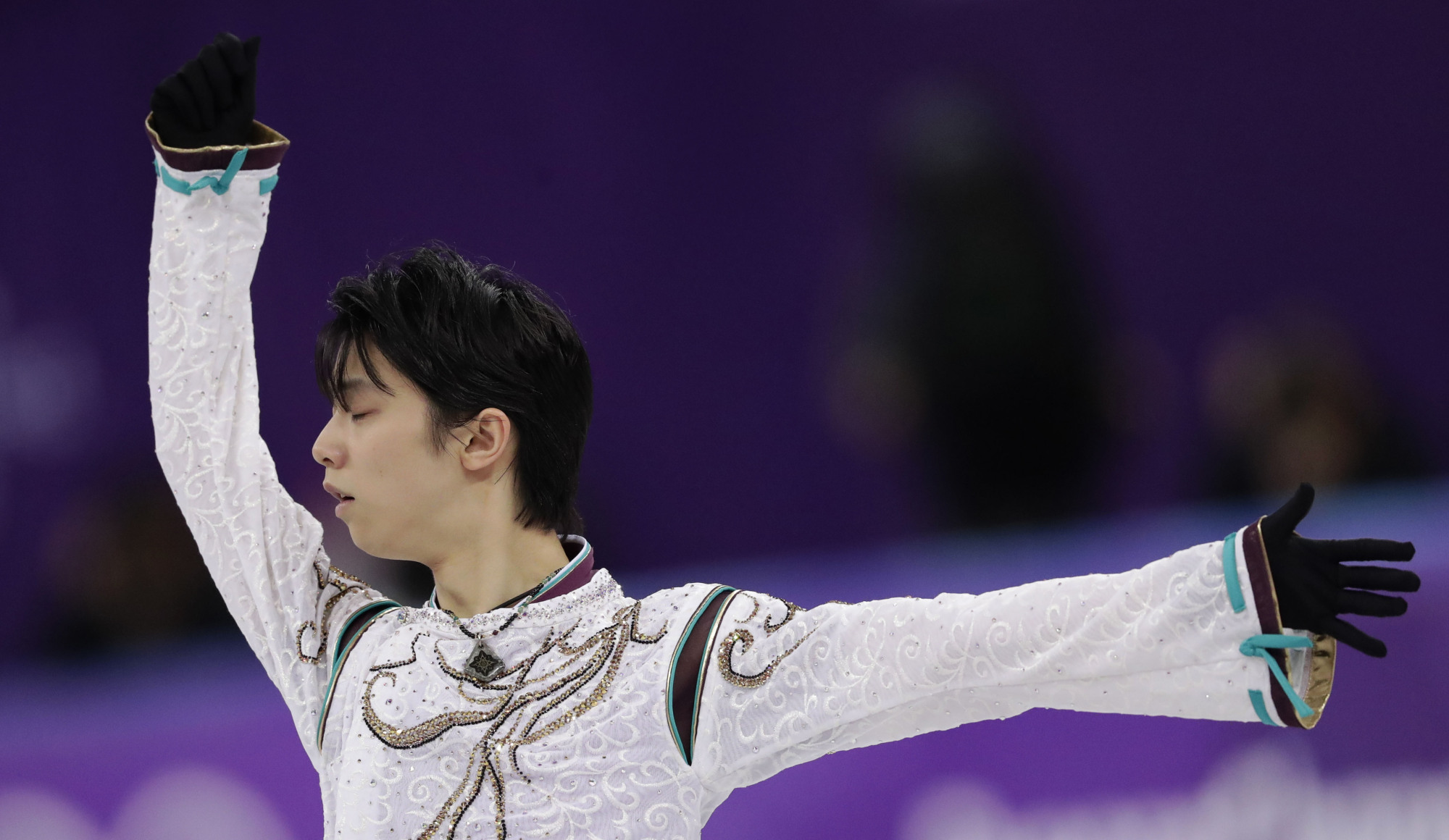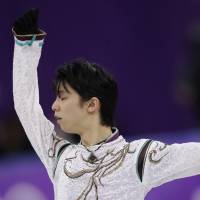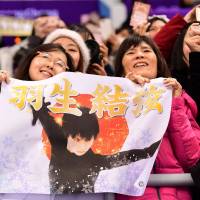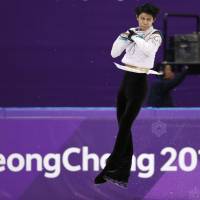Yuzuru Hanyu's epic performance in the free skate at Gangneung Ice Arena on Saturday was one for the ages.
Though not as technically sound as his brilliant free skate at the 2017 world championships in Helsinki, when taking into account the totality of the dynamic — it being the Olympic final, coming back from a serious injury, the hopes of an entire nation resting on his back — it will have to go down as his greatest achievement.
Sitting in the press tribune high above the ice, I could only marvel at what the 23-year-old superstar had pulled off and the manner in which he did it.
I could feel the joy of all of the Japanese fans who had made the journey to South Korea and were proudly holding up the Hinomaru. There were so many Japanese flags that it almost looked like a domestic competition in Japan.
Sports fans love an athlete who can rise to the occasion in the face of a steep challenge, and that is exactly what Hanyu did. But what truly resonated with the masses was the dashing flair in which he made history.
Nearing the end of his free skate, Hanyu employed his trademark hydroblading and then executed a perfect Ina Bauer right in front of the judging panel, and he did all that plus four quads on an ankle he admitted is not fully healed from a serious injury suffered three months ago.
With his victory, Hanyu became the first man since American Dick Button 66 years ago to win consecutive Olympic gold medals. Hanyu is also now part of a select group of just four men in Olympic history to win two straight golds.
The Sendai native joined Sweden's Gillis Grafstrom, Austria's Karl Schafer and Button in the history books. Grafstrom won three straight (1920, 1924, 1928) golds, while Schafer reigned in 1932 and 1936. Button triumphed in 1948 and 1952.
Yuzu, as all the skating writers call him, is much more than just a fantastic skater. He is the pride of Japan and its greatest ambassador.
A highly intelligent, respectful and compassionate person who comes from a good family. He is old school all the way. Somebody who is admired by citizens of all ages.
One of the beautiful things about Japan is the way it has been able to protect and sustain its culture through time. It is a place where honor, dignity and respect still matter.
When you look around the world at other nations, and see how societies are breaking down, you can see what I mean.
Yuzu is a shining example of Japanese values.
He has such a charming and engaging personality. Always accommodating with the media, he will chat at length with you (in Japanese or English), usually until you run out of questions or a handler tells him it is time to move on.
Even when he can't answer your question, he does it in a polite fashion.
When I asked him on Thursday, ahead of Friday's short program, if his right leg was 100 percent healthy, he smiled and replied, "Well I can't really say anything."
Yuzu also has the wonderful ability to laugh at himself.
During the press conference after his victory, he detailed the litany of illnesses and injuries that he has had since winning his first gold in Sochi four years ago.
"Yes there have been a lot of injuries as I look back at the last four years," he said with a laugh, before reciting each one.
Another great attribute Hanyu possesses is his sensitivity for the feelings of others. He paid tribute to bronze medalist and longtime training partner Javier Fernandez of Spain on Saturday.
"Javi has showed me so many brilliant performances," Hanyu stated. "Without him I would never have gone to Canada (to train). He has helped push me."
Fernandez, a two-time world champion, then returned the compliment.
"Yuzu is one of the skaters you can watch and learn from," Fernandez commented. "He can turn a bad moment into a good one. I'm happy to share skating with Yuzu."
The debate has already started about whether or not Hanyu is the greatest skater of all time.
Four-time world champion Kurt Browning of Canada is at the Pyeongchang Games and witnessed Hanyu's short program and free skate. He was asked by The New York Times on Saturday if Hanyu is the best skater in history.
"If you want him to be, you wouldn't be wrong," Browning stated. "Why not. He's everything. He's the skater, he's the jumper, but quintessentially, he's the performer. He seems to have the superpower to take all the pressure, all the expectations and all the lights and all the cameras, and somehow he's able to use it as a competitor."
Ice Time reached out to Japan's first female skating world medalist, Emi Watanabe, for her thoughts on Hanyu.
"No one had any idea how his foot and stamina were going to last," she wrote in an email. "In the end the pressure was not on Yuzu but on us! Praying and hoping he could do his best!"
Watanabe marveled at the living legend's ability to pull off the nearly impossible.
"His power is mysterious," she continued. "How can anyone not skate for two months and do a performance like he did? Like Dick Button, Yuzu will leave a very impressive resume that maybe won't be broken for another half-century or so."
The 88-year-old Button, who does not give out praise easily, watched the proceedings on TV from his home in North Salem, New York, on Saturday and tweeted his respect for the man who equaled his accomplishment.
"Bravo Hanyu, records are made to be tied," he wrote. "Hanyu — Gorgeous. Beautifully choreographed with the music. Terrific theatre!"
Will Hanyu attempt to equal Grafstrom's record of three straight Olympic golds at the 2022 Beijing Games?
"I'm not really thinking about the next Olympic Games," Hanyu said on Saturday. "My ankle must recover. There are a lot of great young skaters coming up. I hope to be able to skate with everyone."
Hanyu discussed his joy for skating and then succinctly summarized what he had done in winning his second Olympic gold.
"As I was skating today, I was glad that I was a figure skater," Hanyu stated. "I have emboldened the sport. Today I have the results, so I am happy. This is a reward for myself. I sacrificed a lot for this. This is an extraordinary occurrence."
Indeed it was.






















With your current subscription plan you can comment on stories. However, before writing your first comment, please create a display name in the Profile section of your subscriber account page.